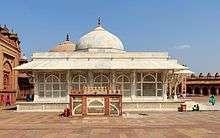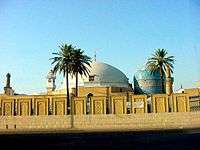Salim Chishti

Salim Chishti (1478 – 1572) (Hindi: सलीम चिश्ती, Urdu: سلیم چشتی ) was a Sufi saint of the Chishti Order during the Mughal Empire in India.
Biography

The Mughal Emperor Akbar came to Chishti's home in Sikri to ask him to pray for a male heir to the throne. Chishti blessed Akbar, and soon the first of three sons was born to him. He named his first son Salim (later emperor Jahangir) in honor of Chishti.[1] A daughter of Sheikh Salim Chishti was the foster mother of Emperor Jahangir. The emperor was deeply attached to his foster mother, as reflected in the Jahangirnama[2] and he was extremely close to her son Qutb-ud-din Khan Koka who was made the governor of Bengal and his descendants are still to be found in Sheikhupur, Badaun.
Akbar held the Sufi in such high regard that he had a great city Fatehpur Sikri built around his camp. His Mughal Court and Courtiers were then relocated there. A shortage of water is said to be the main reason that the city was abandoned and it now sits in remarkably good condition as a mostly deserted city. Now it is one of the main tourist attractions of India.
Salim Chishti tomb



Chishti's tomb was originally built with red sandstone but later converted into a beautiful marble mausoleum. Salim Chishti's Mazar (tomb) is in the middle of the Emperor's Courtyard at Fatehpur Sikri, Uttar Pradesh, India.
The mausoleum was constructed by Akbar as a mark of his respect for the Sufi saint, who foretold the birth of his son, who was named Prince Salim after him and later succeeded Akbar to the throne of the Mughal Empire, as Jahangir.
It is believed that by offering prayers at this mazar whatever one wishes will be fulfilled. There is also a ritual of tying a thread at the marble windows of this Dargah in order to have one's wishes fulfilled.
The ancestral house of Shaikh Salim Chishti has a large Sun motif at its main door and inside has a beautiful array of impressive stone screen and exquisitely carved herring bone roof it is attached to the first building built in Fatehpur Sikri, which is known as "Sangtarash mosque" or Stone Cutter's mosque. One of the oldest buildings in Fatehpur Sikri, Stone Cutter's mosque is situated to the west of the Jami Masjid, which was built by the local stone cutters in honor of Chishti. It has some beautiful architectural features, marking the incorporation of indigenous architectural styles in the construction.
Salim Chishti's mazar is one of the most notable accomplishments of Mughal architecture, surpassed only in reputation, and is flanked by the massive Buland Darwaza or Victory gate on the southern side, the Badshahi darwaza or Emperor's gate on eastern side, and a grand mosque Jama masjid on western side, as well as by courtyards, a reflecting pool, and other tombs. Construction commenced in 1571 and the work was completed fifteen years later.
See also
References
- ↑ Muhammad-Hadi (1999). Preface to The Jahangirnama. Translated by Thackston, Wheeler M. Oxford University Press. p. 4. ISBN 978-0-19-512718-8.
A dervish named Shaykh Salim [Chisti] ... lived in the town of Sikri ... If His Majesty [Akbar]'s wish were divulged to him, there was hope that it would be granted through his prayers. Consequently His Majesty went to the shaykh's house ... Because there had been true intention and firmness of belief, in a short while the tree of hope bore fruit ... For the well-being of this offspring ... he was given the name Sultan Salim.
- ↑ Jahangir, Emperor of Hindustan (1999). The Jahangirnama: Memoirs of Jahangir, Emperor of India. Translated by Thackston, Wheeler M. Oxford University Press. p. 65. ISBN 978-0-19-512718-8.
Qutbuddin Khan Koka's mother passed away. She had given me milk in my mother's stead—indeed, she was kinder than a mother—and I had been raised from infancy in her care. I took one of the legs of her bier on my own shoulder and carried it a bit of the way. I was so grieved and depressed that I lost my appetite for several days and did not change my clothes.
External links
-
 Media related to Salim Chishti Tomb at Wikimedia Commons
Media related to Salim Chishti Tomb at Wikimedia Commons
